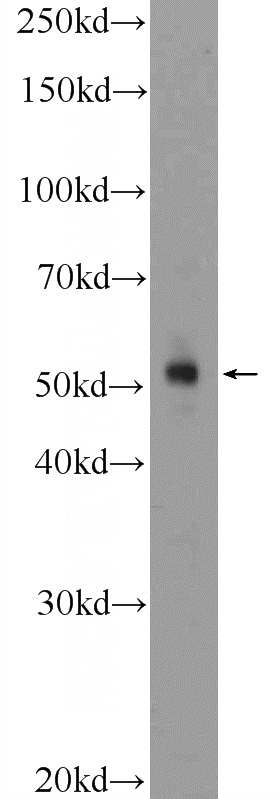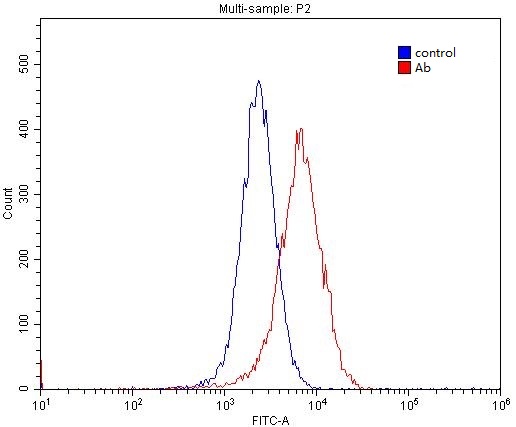-
Product Name
Cyclin E1 antibody
- Documents
-
Description
Cyclin E1 Rabbit Polyclonal antibody. Positive FC detected in MCF-7 cells. Positive WB detected in K-562 cells, HeLa cells, human lung tissue, Jurkat cells, NIH/3T3 cells. Observed molecular weight by Western-blot: 53 kDa
-
Tested applications
ELISA, WB, FC
-
Species reactivity
Human,Mouse,Rat; other species not tested.
-
Alternative names
CCNE antibody; CCNE1 antibody; cyclin E1 antibody; G1/S specific cyclin E1 antibody
-
Isotype
Rabbit IgG
-
Preparation
This antibody was obtained by immunization of Cyclin E1 recombinant protein (Accession Number: NM_001238). Purification method: Antigen affinity purified.
-
Clonality
Polyclonal
-
Formulation
PBS with 0.1% sodium azide and 50% glycerol pH 7.3.
-
Storage instructions
Store at -20℃. DO NOT ALIQUOT
-
Applications
Recommended Dilution:
WB: 1:200-1:2000
-
Validations

K-562 cells were subjected to SDS PAGE followed by western blot with Catalog No:109665(Cyclin E Antibody) at dilution of 1:600

1X10^6 MCF-7 cells were stained with 0.2ug Cyclin E antibody (Catalog No:109665, red) and control antibody (blue). Fixed with 4% PFA blocked with 3% BSA (30 min). Alexa Fluor 488-congugated AffiniPure Goat Anti-Rabbit IgG(H+L) with dilution 1:1500.
-
Background
Cyclin E1 (CCNE1) is a member of the highly conserved cyclin family, whose members are characterized by a dramatic periodicity in protein abundance through the cell cycle. CCNE1, an essential cyclin activating Cdk2, regulates the G1-S phase transition of the mammalian cell division cycle. Its timing expression plays a direct role in the initiation of DNA replication , the control of histone biosynthesis, and the centrosome cycle. CCNE1 is associated with disease progression in various malignancies and is associated clinically with poor prognosis.
-
References
- Gong K, Xie J, Yi H, Li W. CS055 (Chidamide/HBI-8000), a novel histone deacetylase inhibitor, induces G1 arrest, ROS-dependent apoptosis and differentiation in human leukaemia cells. The Biochemical journal. 443(3):735-46. 2012.
- Hu HM, Chen Y, Liu L. C1orf61 acts as a tumor activator in human hepatocellular carcinoma and is associated with tumorigenesis and metastasis. FASEB journal : official publication of the Federation of American Societies for Experimental Biology. 27(1):163-73. 2013.
- Zheng L, Wang X, Luo W, Zhan Y, Zhang Y. Brucine, an effective natural compound derived from nux-vomica, induces G1 phase arrest and apoptosis in LoVo cells. Food and chemical toxicology : an international journal published for the British Industrial Biological Research Association. 58:332-9. 2013.
- Sun Q, Wang R, Wang Y, Luo J, Wang P, Cheng B. Notch1 is a potential therapeutic target for the treatment of human hepatitis B virus X protein-associated hepatocellular carcinoma. Oncology reports. 31(2):933-9. 2014.
- Song Y, Gong K, Yan H. Sj7170, a unique dual-function peptide with a specific α-chymotrypsin inhibitory activity and a potent tumor-activating effect from scorpion venom. The Journal of biological chemistry. 289(17):11667-80. 2014.
- Dai B, Zhan Y, Qi J, Zhang Y. Eupolyphaga sinensis Walker inhibits human chronic myeloid leukemia cell K562 growth by inducing G2-M phase cell cycle arrest and targeting EGFR signaling pathway and in S180 tumor-bearing mice. Environmental toxicology and pharmacology. 37(3):1177-85. 2014.
- Zhang Y, Zhan Y, Zhang D. Eupolyphaga sinensis walker displays inhibition on hepatocellular carcinoma through regulating cell growth and metastasis signaling. Scientific reports. 4:5518. 2014.
- Xiao W, Jiang Y, Men Q. Tetrandrine induces G1/S cell cycle arrest through the ROS/Akt pathway in EOMA cells and inhibits angiogenesis in vivo. International journal of oncology. 46(1):360-8. 2015.
Related Products / Services
Please note: All products are "FOR RESEARCH USE ONLY AND ARE NOT INTENDED FOR DIAGNOSTIC OR THERAPEUTIC USE"
